
Any Flint Coney sauce recipe which includes ground hot dogs is not a Flint Coney sauce recipe whatsoever. Flint Journal Food Editor Joy Gallagher was the source of the popular, unrealistic, and always-evolving folklore surrounding this recipe. The recipe’s real origins date back to 1928 in the Indianapolis Star, with considerable development then occurring beginning in 1938 in a food column in the Oregon Journal in Portland. The recipe’s first printing in Michigan occurred in the Frankenmuth Historical Association Cook Book in 1974, more than a year before Joy Gallagher’s first Flint Journal’s printing on November 25, 1975.
The recipe has been published as misinformation as a Flint Coney sauce recipe multiple times, adding to the folklore. In his book “Scoops: Ron Krueger’s inside dish on The Flint Journal’s favorite recipes” (Flint Journal, 2000), the long-time food writer and Ms. Gallagher’s successor included the ground hot dog recipe she had printed earlier, without a credit listed in Krueger’s book. I asked Mr. Krueger about this on November 6, 2014, and he replied, “That recipe appeared in The Journal several times over the years. Don’t think I ever saw it in the context of a story or ever saw any attribution. It always included the word ‘original’ in the title [which has turned out not to be true], but anybody who knows anything knows otherwise.”
Before the Flint Journal's Publication ...
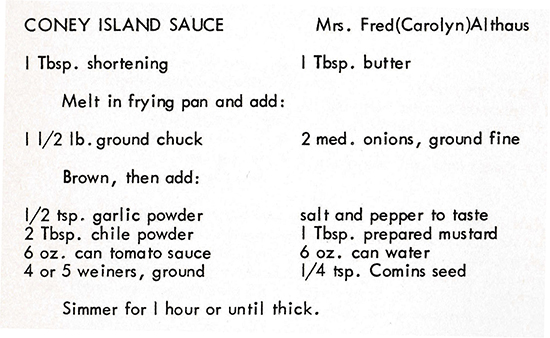
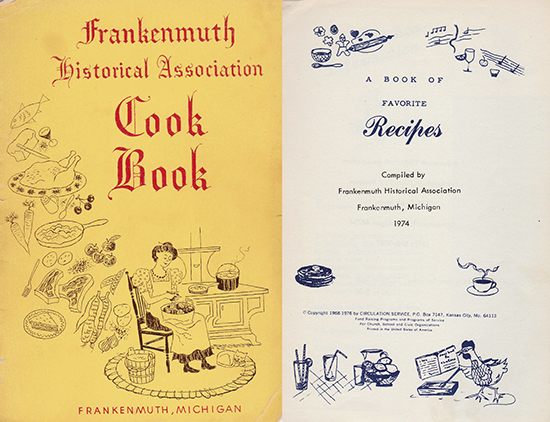
Historical Variations and Development
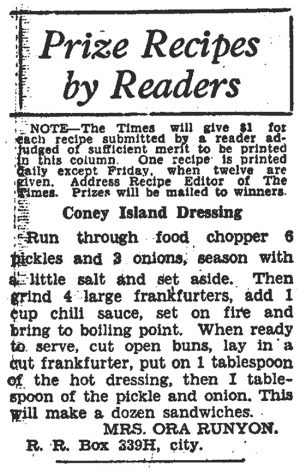

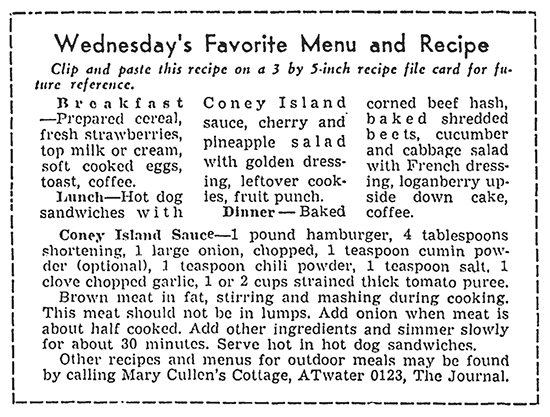
On July 3, 1955, “Mary Cullen” printed another evolution of the recipe on the Oregon Journal.
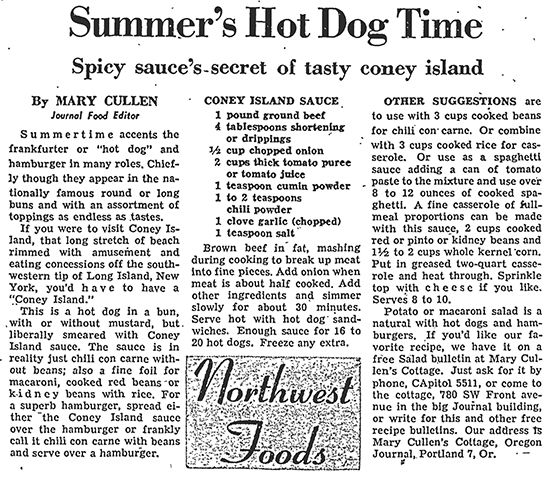
Adding the mustard and ground hot dogs to this recipe gives a rather strong starting point for the recipe published in the Frankenmuth cookbook in 1974. While the “Other Suggestions” in the third column of the piece don’t mention adding ground hot dogs, doing so wouldn’t be much of a leap.
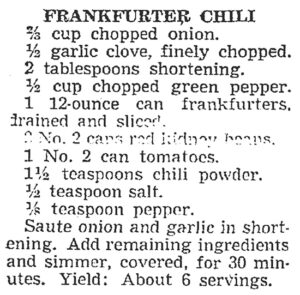
On August 9, 1956, a recipe printed by an unnamed Food Editor in the Columbus Dispatch was specifically titled “Coney Island Hot Dog Sauce”, the same title as in the Joy Gallagher version twenty years later. The ingredient list appears to be an evolution of the 1955 Oregon Journal recipe.
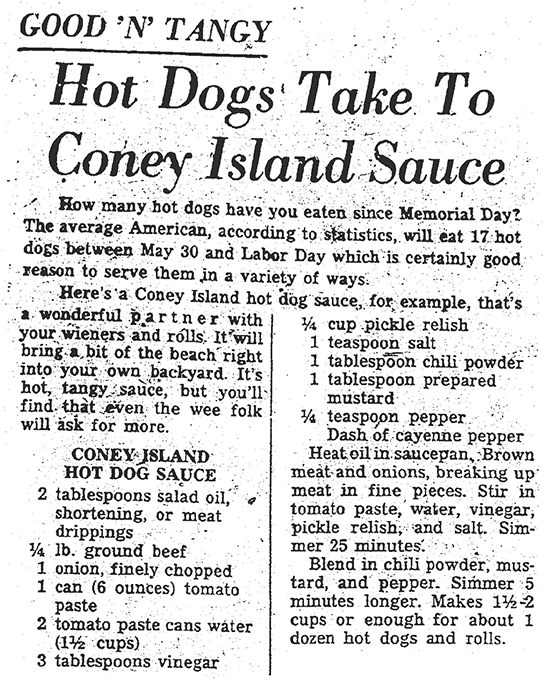
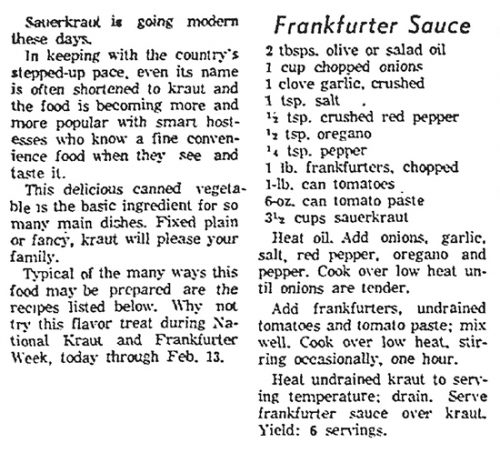
Jean Crain's Request for the Flint Coney Sauce Recipe
Joy Gallagher (whose full name was Peggy Joyce Hawley Gallagher) was appointed Editor of the Family Section of the Flint Journal on January 1, 1973, after coming from the Newport News Times Tribune where she’d been the Women’s Editor for the previous six years. (“Joy Gallagher Appointed Editor of Family Section”, Flint Journal) She had been added to the Family Section of the Journal as a writer, as announced in a piece titled “A Bit of Joy from Virginia” on December 30, 1971. This was while she was still living in Newport News because “I recently bought a lovely mobile home and parked it so close to the Chesapeake Bay that I can be out my door and throwing out crab nets in two minutes flat.” The 1973 article then indicated she had become a member of the Journal staff on September 5, 1972, meaning she had relocated to Flint by then.
In a “Kitchen Clinic” column responding to readers’ letters, published on November 4, 1975, Gallagher included a couple of requests from a Jean Crain:
The Recipe's First Printing
Over the following few weeks there was apparently more than one response to Jean Craig’s request. The response Gallagher chose to publish, though, contained quite a few holes in its backstory.
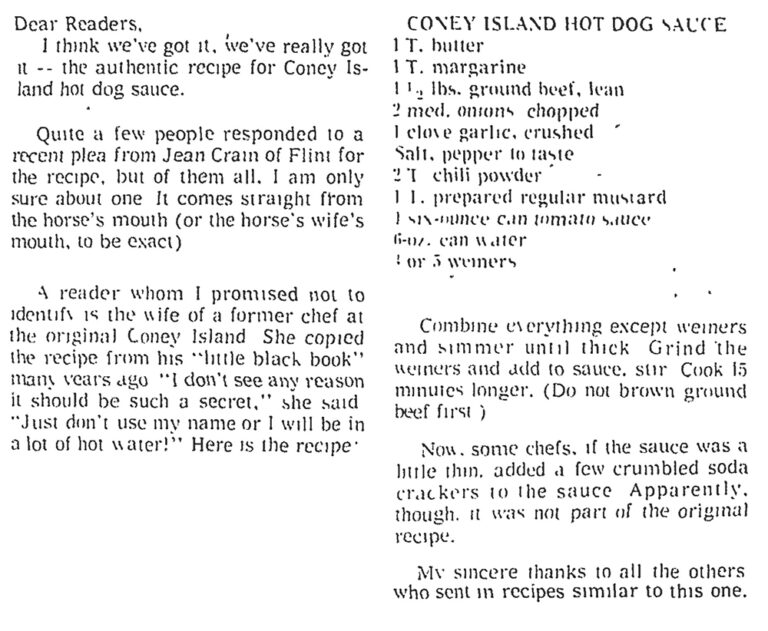
Joy Gallagher’s reply to Jean Crain. This is the first public printing of the recipe. (Flint Journal, November 25, 1975)
Another issue is the recipe’s quantity. If this was indeed the recipe for the original sauce, the resulting quantity would be at least twenty times the quantity given in this recipe, enough for an average day of service. The Chef would not have already broken it down into a quantity succinct enough to be able to specify “1 six-ounce can tomato sauce” as available at grocery stores of the time.
The real issue though is that anonymous sources can rarely be trusted. So, the Chef’s wife dug through his personal recipe book to see if she could find the sauce recipe from Flint Original Coney Island because “I don’t see any reason why it should be such a secret.” The problem with that is, even if the sequence of events were true, she wouldn’t have known whether or not the recipe she was looking at was indeed the restaurant’s coney sauce recipe without checking with the Chef.
Readers Refute the Recipe
It took less than a couple of weeks, though, for the first letters refuting the recipe to show up on Gallagher’s desk. In another column of readers’ responses to other requests, published on December 9, 1975, a Sylvia DeFrain of Flint provided a requested recipe for “Past Perfect Fruitcake.” Besides that recipe, she also included comments on the recipe for coney sauce:
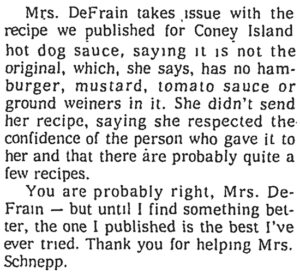
Note Gallagher’s comment of “You are probably right, Mrs. DeFrain” … but in the end she still did not back down regarding the recipe’s possible authenticity.
Restaurant Operators Refute the Recipe
It would appear that, over the next year, Gallagher heard from more than one of the Coney Island restaurant operators in Flint:
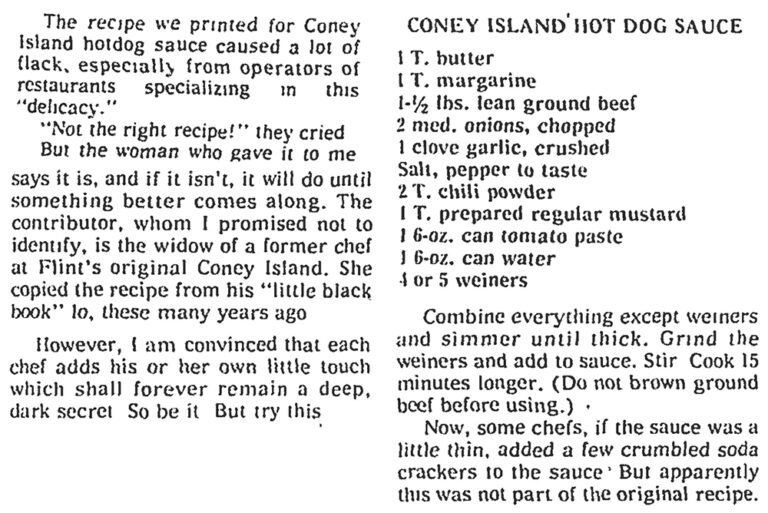
The second printing of the recipe, which included restaurant operators refuting its accuracy to no avail. (Flint Journal, April 12, 1977)
In this second printing of the recipe, Gallagher puts more trust in her anonymous source than she does the restaurant operators themselves, and would continue to do so “until something better comes along.” It was as though she was taunting those operators to give her their own recipes for their version of the sauce. But at this point, the source is identified as the former Chef’s widow. Apparently he had passed away since the recipe’s first printing. Why not then identify herself since she’ll no longer be in “hot water”? This causes the source to be even more suspicious and unreliable than before.
The Recipe's Third Printing, It's Now "Original"
It would seem Gallagher had gotten her wish for “something better” over the following year. In her column published on May 23, 1978, she published two recipes for “Flint-Style Coney Sauce.” At this point though, her backing of the ground hot dog recipe’s authenticity began to wane.
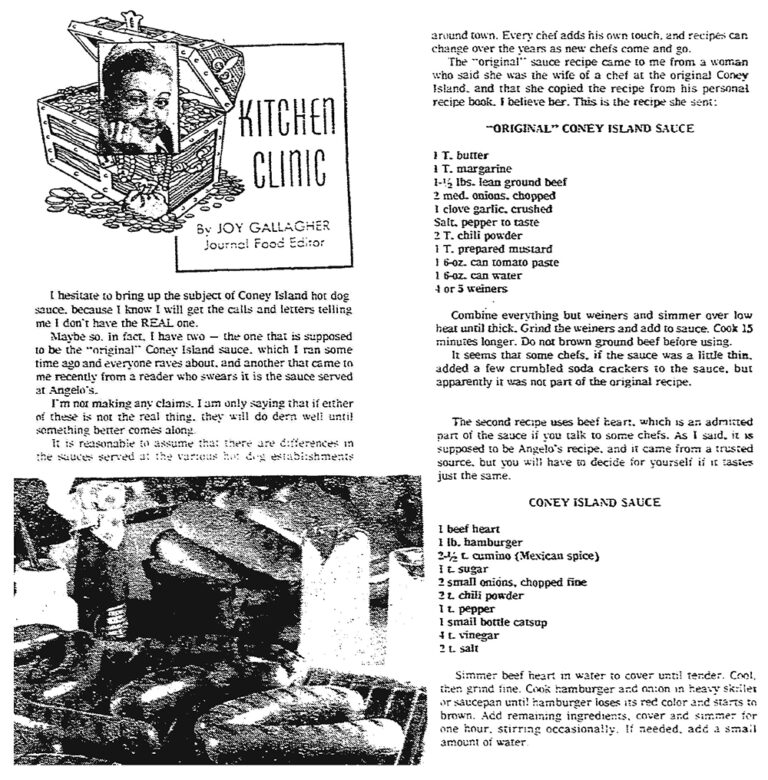
The recipe’s third printing. This includes a second version which begins with beef heart while also including “catsup” and vinegar. (Flint Journal, May 23, 1978)
It’s interesting to note that the Angelo’s statement by Gallagher was for the beef heart recipe in this column. However, in the myth the Angelo’s origin has always been attributed to the former “original Coney Island” ground hot dog recipe, which Gallagher had never said herself.
Unlike in previous columns, in this particular column Gallagher used phrases such as “calls and letters telling me I don’t have the REAL one,” “the one that is supposed to be the ‘original’ coney island sauce” and more importantly, “I’m not making any claims.” In considering these particular phrases, it is easy to conclude that Gallagher herself ended up not believing a word of any of the rumors regarding the ground hot dog recipe.
Finally, Gallagher’s column of May 23, 1978, is apparently the direct source of the two “Flint-style Coney Sauce” recipes included on the last page of “Two to Go: A Short History of Flint’s Coney Island Restaurants published by the Genesee County Historical Society” in 2007. While the authors of Two to Go didn’t quote Gallagher’s column directly and included the two recipes themselves without a reference, they are indeed identical to the recipes in that column.
Gallagher herself never printed any coney sauce recipes in the Journal again. On April 24, 1979, she published a Goodbye Note, stating she had resigned effective April 27. Her final column was published May 1, with Gallagher being the speaker at the Goodwill Industries Annual Meeting at Sarvis Center that evening. In her Goodbye Note, she invited her readers to attend the public meeting.
The 2011 Facebook Posting, and Subsequent Circulations
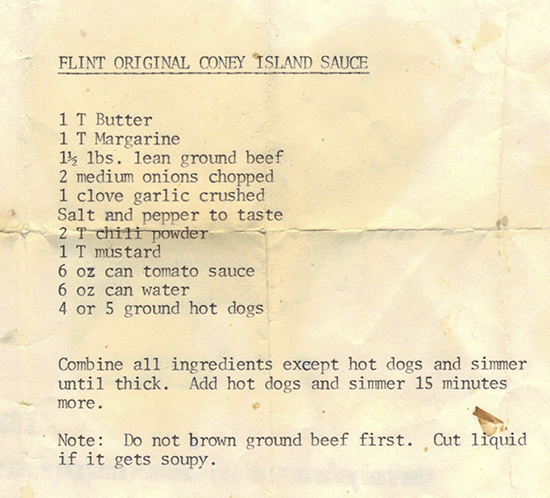
On May 28, 2011 the late Robert Morgan, a retired General Motors tool & die maker living in Swartz Creek until his passing on September 12, 2017, posted this image of the ground hot dog recipe to Facebook, where it has been shared more than 13,000 times. In July of 2015 a Carol Jones posted the same image to her Facebook account, and by the end of the year the image had been shared almost 6,000 times. Other Facebook users who shared or commented on this image continued the previous folklore, indicating a relative had also received this same recipe from an owner, the originator’s wife, a former employee, etc. By this point the folklore has overshadowed the reality of the recipe having originated solely with Joy Gallagher of the Flint Journal as described above, especially since the distribution of the recipe through social media continues the fallacy of “If it’s on the internet, it must be true.”

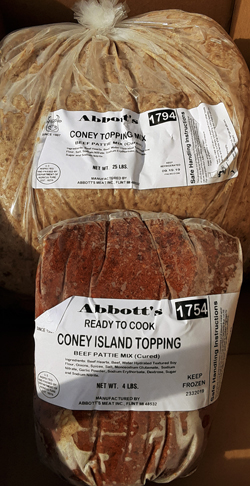
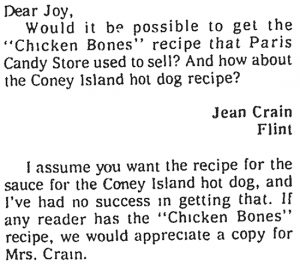
I love reading the Coney history and the myths of the Coney recipe! Some folks could care less about the origins of the sauce but then there are many more, like me, that thoroughly enjoy everything Coney! I’m thrilled to have my unique history with Angelo, Tom Z and Tom Branoff, arguably the best to do it!
Thank you again, Dave!! You rock!